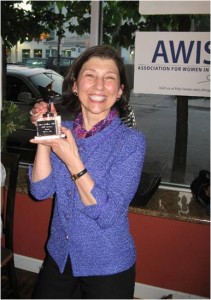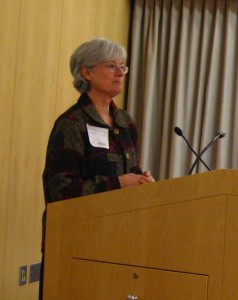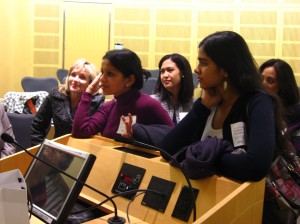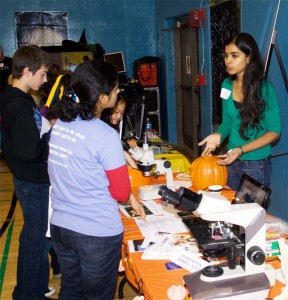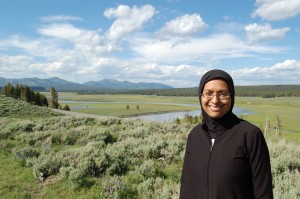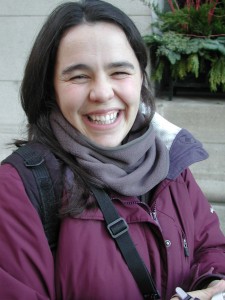July 2010 Scientist of the Month: Debby Quock, M.S.
by Eunji Chung
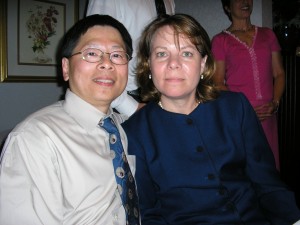 Debby Quock, M.S. is a Computer Scientist at Argonne National Laboratory (ANL). Her work focuses on applications that support real-time accelerator controls, specifically geared particle accelerator controls and software. In addition, at ANL, Debby spear-headed “Introduce a Girl to Engineering Day (IGED)”, a student outreach event for girls in middle school. Before Argonne, Debby was a Senior Chemical Engineer for Texaco, Inc. and a consultant for Technology Evaluations, Inc. Naturally inclined towards scientific reasoning, mathematical interpretation, and analytical problem-solving from a young age, she pursued her B.S. in chemical engineering at the University of Missouri-Columbia, followed by her first M.S. degrees in chemical engineering at Rice University, and a second M.S. degree in computer science at the University of Chicago. During her studies in the late 1970’s, the U.S. was experiencing an oil shortage and energy crisis and Debby felt the urgency and the significance of pursuing a degree that would apply all of the basic sciences in order to solve real world problems (a problem that is still relevant today). Debby was a Senior Engineer at Texaco, Inc. in the Alternative Energy group and worked on improving oil refinery. Debby attributes both her professional and personal success to her family’s support and dedication to education, starting with her father, who designed the first periscope used in space for NASA and her late mother who pursued both a masters in English and an MBA during a time when it was unheard of for women to obtain an MBA in a male-dominated business culture. In addition, she speaks of the fullness and adventures of love, marriage, and children, and gives a bit of her insight in regards to current oil spills.
Debby Quock, M.S. is a Computer Scientist at Argonne National Laboratory (ANL). Her work focuses on applications that support real-time accelerator controls, specifically geared particle accelerator controls and software. In addition, at ANL, Debby spear-headed “Introduce a Girl to Engineering Day (IGED)”, a student outreach event for girls in middle school. Before Argonne, Debby was a Senior Chemical Engineer for Texaco, Inc. and a consultant for Technology Evaluations, Inc. Naturally inclined towards scientific reasoning, mathematical interpretation, and analytical problem-solving from a young age, she pursued her B.S. in chemical engineering at the University of Missouri-Columbia, followed by her first M.S. degrees in chemical engineering at Rice University, and a second M.S. degree in computer science at the University of Chicago. During her studies in the late 1970’s, the U.S. was experiencing an oil shortage and energy crisis and Debby felt the urgency and the significance of pursuing a degree that would apply all of the basic sciences in order to solve real world problems (a problem that is still relevant today). Debby was a Senior Engineer at Texaco, Inc. in the Alternative Energy group and worked on improving oil refinery. Debby attributes both her professional and personal success to her family’s support and dedication to education, starting with her father, who designed the first periscope used in space for NASA and her late mother who pursued both a masters in English and an MBA during a time when it was unheard of for women to obtain an MBA in a male-dominated business culture. In addition, she speaks of the fullness and adventures of love, marriage, and children, and gives a bit of her insight in regards to current oil spills.
EJC: How did you get interested in science?
DQ: My father had a B.S. degree in Physics and a M.S. degree in aeronautical engineering. He designed for NASA and he typically explained events in life through the eyes of a scientist/engineer to my brother, sister and me. My father’s natural curiosity about how things work and how to design new, better solutions was contagious, [and] my choice to pursue science was never really a conscious decision, but rather just always out there as the pastime that I enjoy most and wanted to be a large part of my life.
EJC: How did you end up at Argonne?
DQ: I quit Texaco Inc. in Houston, Texas at the level/title “Senior Chemical Engineer” to stay home full-time with my daughter (quit work when she was 11 months old). From there, I followed my husband and his career from Texas to upstate New York to the suburbs of Chicago. After moving to the suburbs of Chicago, I became antsy to get back into the workforce as I tremendously missed solving technical problems. I worked part-time for one school year as a substitute teacher in the St. Charles, IL school district where I taught everything from P.E. to advanced placement high school physics. It was desirable to have my summers off to be with my children, but I learned while teaching high school physics, that I would rather be “doing” the physics than teaching it to others.
EJC: Were there any professional or personal obstacles you encountered while pursuing your career as a woman in science?
DQ: Yes, many. Having children threw me for a curve as I never really thought that I would ever get married, much less have children. I was the type that was completely consumed and satisfied by my interests in science and engineering. I met my husband, Joe Quock, at Texaco Inc., we were in the same group that I was first hired into. He has B.S. and M.S. degrees in chemical engineering and currently works for UOP in Des Plaines, IL as a project manager for designing oil refineries. Now, I can’t imagine having a better soul mate and father to our children – he is completely supportive of my career and also, extremely supportive of our children’s interests in pursuing careers in engineering /science. My daughter has a B.S. degree in chemical engineering and is currently working on her Ph.D. degree in Chemical Engineering. My son is currently working on his B.S. degree in mechanical engineering. While I worked on getting my second masters degree at night school at the University of Chicago while working at Argonne full-time, my husband took over the basic care needs of our children – scheduling dentist and doctor appointments, etc. (all while he was a project manager for UOP meeting the high demands of that job). Even with the tremendous support from my husband as a great father, I did make the very difficult choice of quitting my job at Texaco Inc. to stay home full-time. At that time in history of the oil industry (1980’s), it was expected for engineers to work more than 40 hours per week. I often went in to work on Saturdays, and brought work home on weekdays. After my daughter was born, I asked Texaco if I could switch to working 20 hours per week and was turned down – this was a new concept to the engineering community in the 1980’s, that women would want to work part-time after having children, and on highly challenging technical projects. I ended up staying home full-time for 7 years, but stayed very active in adult projects and activities through volunteer work and going to night school taking business and computer science courses.
EJC: If there was one thing you would advise young scientists, what would it be?
DQ: Join and get involved with professional organizations that are related to your field of work. This will allow you to network, make new friends with those who have similar interests, and serve on committees whose work ultimately gives back to society.
EJC: In the next ten years, what do you envision for yourself? What do you want to achieve?
DQ: I want to continue to be challenged technically and to be able to apply my analytical skills to the highest level possible. I find a tremendous amount of satisfaction in mentoring others and helping them grow as scientists/engineers. At ANL, I have had the pleasure and opportunity to manage and lead projects that include physicists, engineers, computer scientists and college students working part-time or as summer interns. I want to achieve helping others reach their career goals and help to groom the next generation of scientists/engineers.
EJC: The U.S. has a major oil spill to clean up today. From your experience, could you give us your professional observation on the importance of taking precautionary measures?
DQ: As engineers and scientists, we can continuously push ourselves to research and design facilities that exceed and are beyond the current “best practices” of our fields. Not for the sake of producing more profits, or in the case of government operated particle accelerators, delivering more “beam time”, but for the sake of safety of personnel and equipment. At Argonne, incorporating safety into everything that we do has become a major initiative from the lab director on down. The message of Argonne being a safety-focused work culture is exhibited by posters on the topic of safety displayed throughout all buildings, many safety training courses, detailed and thorough validation and trouble-shooting procedures for critical safety systems, periodic lectures to staff by safety experts, and more. Argonne handles a wide variety of dangerous chemicals, radiation, electrical systems and more; so incorporating the mindset of safety first as design engineers and research scientists is crucial. It (safety) has become a way of life at Argonne.
Nomination submitted by Eleanor Taylor of Argonne National Laboratory. Article by AWIS Chicago Staff Writer Eunji Chung. Ms. Chung is a PhD candidate at Northwestern University. Her current research involves the use of biodegradable materials and mesenchymal stem cells for orthopaedic applications. Although her plans after graduation are not solidified, she is interested in careers in academia, patent law, and entrepreneurship.
“Introduce A Girl to Engineering Day” is an annual event begun February 21, 2002 to connect middle school aged girls with positive role models of women engineers. Research indicates that girls lose interest in subjects leading into engineering careers long before college and demonstrates a need to introduce and encourage young girls to the engineering profession through job shadowing is essential. To learn more about “Introduce A Girl to Engineering Day”, please click here to read article published in the Chicago Sun Times.
*Know a scientist you think should be featured in an upcoming “Scientist of the Month” article? Send nominations to Jessica Reimer. Your nominee does not need to be an AWIS member or a woman, but should promote the advancement of women in science, technology, mathematics and engineering.
Want to keep yourself up-to-date on AWIS Chicago activities? Follow AWIS Chicago on Twitter! You can request to be added to our listserve by clicking here, and join the AWIS Chicago group on LinkedIn and Facebook by clicking the icons on the bottom right of this page.


